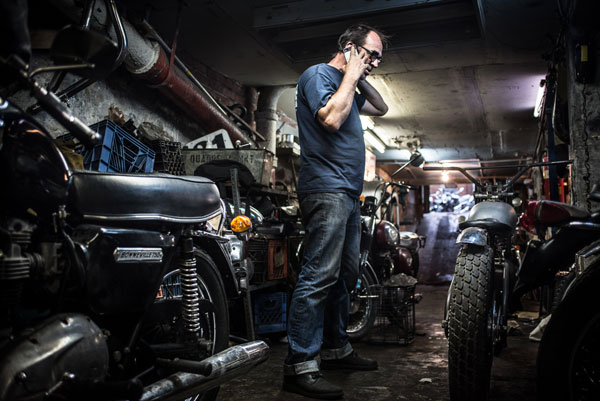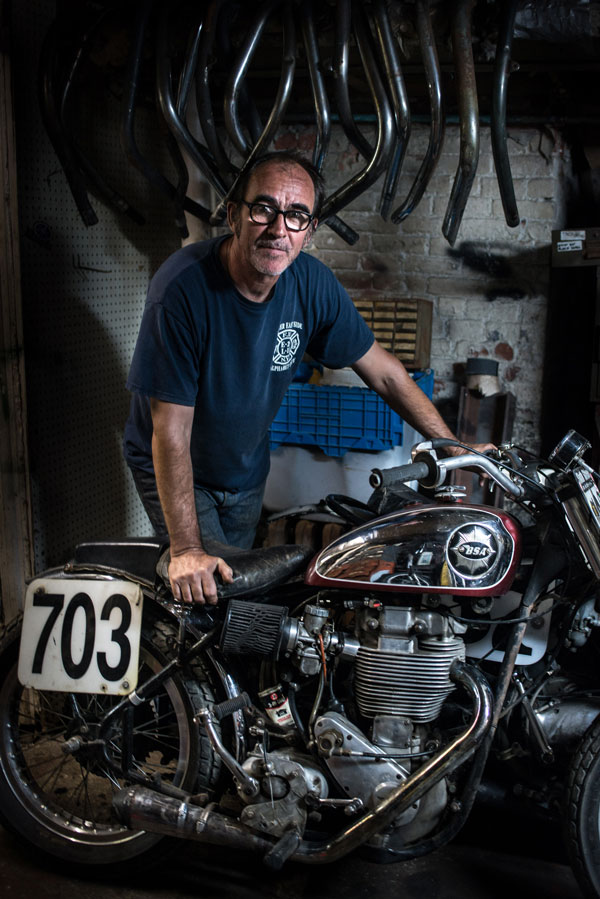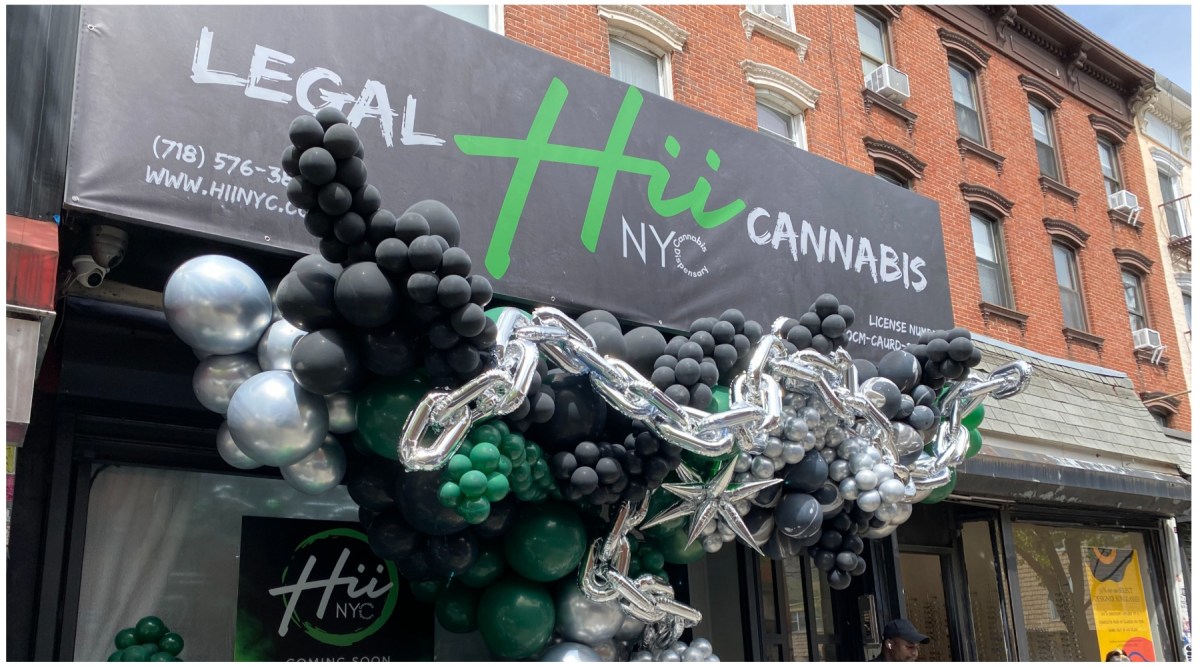
The basement of the Sixth Street Specials shop, which extends back 100 feet, was flooded last year during Hurricane Sandy. Mackie lost six bikes, as well as large electrical tools and all the motorcycle parts he had amassed over 27 years.
BY HEATHER DUBIN | Hugh Mackie thinks everything is fixable. This is exactly what you would want to hear from the seasoned owner of Sixth Street Specials, a motorcycle repair shop in the East Village.
During a recent interview — while the shop, located on E. Sixth St. near Avenue C, was buzzing with activity — Mackie, 54, his son Keith, 24, and Fumi Matsueda, 34, a mechanic from Ashikaga, Japan, spoke about Sixth Street Specials and what vintage bikes mean to them.
Mackie, originally from Garvin, Ayrshire, a little harbor town on the southwest coast of Scotland, bolted to Paris the day he graduated from the Glasgow School of Art. He lived there for a year and worked on a film building sets. When his American girlfriend, a runway fashion model, who later became his first wife, had to return to the States, Mackie decided to join her.
They initially moved to Second Ave. between Fourth and Fifth Sts. in 1981, and he worked in construction.
“Second Avenue was much more of a divide line for the East Village,” he recalled. “Come over to First [Avenue] it’d get a little rough, and you couldn’t go east of [Avenue] A.”
Mackie worked on buildings in the neighborhood, as he put it, “starting the gentrification of it.” He earned about $1,000 a week and remarked how that was a sizeable income then. “I don’t know if I’ve ever managed to re-create that,” he said.
After the couple split, Mackie stayed in their apartment on Avenue B between 10th and 11th Sts., where they had been robbed, and all their wedding gifts were taken.
“It was a bombed-out shell, it was absolutely horrendous down here,” he said. “People coming to the area to buy and sell drugs. I was in my early 20s and enjoying all of that.”

Hugh Mackie and his personal racing bike, a 1957 BSA factory race bike, one of 200 made. This year, he won the American Motorcycle Association Vintage National Dirt Track Championship Series with it.
He was also privy to the emerging art and party scenes, and rode around on motorcycles with his friends.
Mackie became friends with Dimitri Turin, stepson of the writer and Nobel Prize winner Alexander Solzhenitsyn, and the two opened up a construction company together. Tinkering with old British motorcycles was a pastime for Mackie, and the two friends partnered again in 1986 to establish Sixth Street Specials, in the basement of a former nightclub called Neither Nor.
“When we moved in here, we were a real live presence on the block,” Mackie said. “People felt safe down here walking up and down the block. Now I’m the eyesore, and everybody complains about me — time is marching on.”
Mackie, who closes shop at 6 p.m., speculated that noise from the bikes scares the senior citizens in the housing complex next door. Also, he noted, Harley-Davidson motorcycle riders frequently gun their engines when they pass the shop and see vintage Triumph, Norton and Birmingham Small Arms Company (BSA) bikes parked outside.
Over the years, the shop took off through word of mouth and the partners’ handiwork.
“We were buying old bikes in the countryside. The whole thing was growing as a hobby and a scene,” he said. The friends rode in the East Village on vintage bikes and were renowned for it. Mackie and Turin tired of construction in 1992, and went full time with the shop to focus more on learning how to fix the bikes and ride them.
By this point, Mackie had remarried in 1988 to Pat Mackie, and they had Keith the next year, followed by their daughter, Tiger, in 1994. Sadly, that same year, Turin, his partner and close friend, died.
The eastern part of the East Village was no longer the wild frontier it once was, and in 1996, the Mackies moved in near the shop, where they currently live.
Keith, who has worked summers at the shop since he was 13, has been there full time the past two years after finishing college, where he studied drawing and painting.
“It’s weird, I did all that and now I’m back here fixing bikes,” he said, “which is kind of what I thought I’d always be doing.” Keith respects that his dad created the shop, and wants to continue its legacy.
While he still paints and draws on the side, and would rather do that, he said working with his dad is a “close second.” People have suggested Keith fuse the two by painting bikes, but he prefers black-and-white ink drawings and animation. Sixth Street Specials does not advertise, except for T-shirts and stickers, which are designed by Keith.
He mostly does bike pickups and is a shop hand. Earlier that day, Keith had cleaned up and started a 1971 Triumph Rickman that was having trouble.
He explained that his dad was fixing a 1970 Triumph Bonneville, belonging to Mike Kramer, who lives nearby and was helping out. The bike had its original paint and parts, which increases its value. Some people create choppers (motorcycles with the frames cut up) with older classic bikes, but Hugh does not like to do that.
“We’re trying to just restore the original way and keep the scene alive — as my dad would say,” Keith said.
The shop is as much about the scene as it is about repairs. Many motorcycle aficionados hang out to talk and observe Hugh at work.
“There are rumors that some people admire Hugh so much they get tattoos about Sixth Street,” Kramer said. Seconds later, he revealed an elaborate tattoo on his whole lower right leg with the words “Sixth Street Hooligan” above it.
There is a racing element to the shop, too, and Keith, who races for fun on trails Upstate with his dad, gave the lowdown.
“These guys do American-style bike racing, from the ’70s called ‘flat track,’” Keith explained. “It’s a dirt oval, as opposed to the new races you see over huge jumps or along paved roads.”
They race vintage Triumphs and Yamahas, and Hugh, who began the sport at 43, rides a BSA.
Keith is content to leave the track to his dad.
“I like racing with these guys when there’s no pressure,” he said. “I don’t like it when it’s about a trophy.” Even though the guys tell him it has nothing to do with winning, he knows better.
Aware that nepotism serves him well, Keith readily admits he is not the best employee. His desire has shifted to art these days, and he thinks his dad spots him daydreaming at work.
“I get away with everything,” he said with a grin. “If I was someone else, I would’ve been fired a long time ago.”
Matsueda, the unrelated helper in the shop, has been in the mix for six years. He worked as a mechanic on Yamahas in Japan, but was unfamiliar with British bikes. After a climb at Sixth Street Specials over the years from floor sweeper to welder to mechanic, Matsueda was diligently rebuilding the motor of a 1963 Triumph Bonneville that day. Making the switch to British bikes was not easy.
“It takes a while,” he said. “I’m still learning. It’s a very interesting world with so much history.”
Four years ago, Hugh invited Matsueda to a flat-track race, and the former novice has been hooked ever since. At that race, he slid off the bike a few times, and came in last in his heat. However, due to a technicality — another guy’s bike broke down — Matsueda was bumped up to third place.
He fondly recalled the plastic “tiny stupid third-place trophy” they gave him, which spurred him on to become a better racer.
“It feels good to win,” Hugh interjected. “He’s really well-known.”
Matsueda competes nationally now, and claims flat-track racing and the shop are why he remains in the States. In addition to his quest for victory, Matsueda aspires to stand on the winners’ podium to also represent the shop.
When asked whether Keith receives special treatment, Matsueda declined to comment on the family business. Matsueda has a good working relationship with Hugh, and they share a mutual respect for each other’s ideas.
“He’s the reason actually that I’m still here,” he said. “He gave me all his friends, opportunities and introduced me. He gave me everything he has; otherwise, it would’ve been very difficult for me to make my way in this world.”
Hugh’s generosity extends to his family, friends and customers. While Keith was making a bike pickup, Hugh admitted that working with a family member has pros and cons.
“I can’t beat him up since we’re related,” he joked. Hugh thinks he’s a good kid and a talented painter. “He’s a much better artist than he is this,” he said. “His mom would tell you he’s a genius. As far as we’re concerned, he’s better than [Jean-Michel] Basquiat in that vein.”
Working at the shop long term may not be for Keith, but the more immediate concern is Sixth Street Special’s survival.
“The whole neighborhood has been built to death, overpopulated and overpriced,” Hugh said. “We’re very lucky to still be here.”
He rents the space, and prospective buyers of the building were a regular occurrence before the recession. Since then, his rent has increased annually, and Hugh, who struggles to pay it, only recently raised his hourly rate from $75 to $90. He used to sell bikes also until, he said, it became “too much of a headache.”
His new customers these days are wealthier Manhattanites who buy costly modern bikes made to look old. Hugh’s loyal client base includes celebrities and regular folk with vintage bikes, from a 300-mile radius, and they keep him going just with repairs. For now, Hugh plans to stay put until Tiger is done with college. As for the future, he said, he will endure, “as long as it lasts.”

















